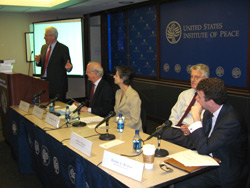Can "Smart Power" Leash the Dogs of War?
Is it possible to fight war and manage conflict at the same time?
Panelists will explore the proposition that peacemaking and conflict management are essential for creating a less divided, less conflicted world. The discussion will focus on whether the international community can simultaneously check hostile adversaries to the international order and make peace in existing conflict zones.

Panelists at the event.
When the Cold War ended, many hoped for a more peaceful world order. However, sectarian violence in the Balkans, Africa and the Middle East, the emergence of global, mass casualty terrorism and a growing strain between Islam and the West raise less promising scenarios. In addition, international norms and institutions face severe challenges as exemplified by the growing reality of WMD proliferation.
Some argue that a new approach is required to leash today's dogs of war—an approach focused on using "Smart Power" to engage the assets, institutions and instruments of official and nonofficial diplomacy and military power.
To explore these issues, USIP president Richard Solomon will moderate this dialogue among four top thinkers in the field: Barbara Slavin, Daniel Byman, Chester Crocker and Andrew Mack.
Copies of the recent USIP Press book Leashing the Dogs of War: Conflict Management in a Divided World, edited by Chester A. Crocker, Fen Osler Hampson and Pamela Aall, will be available for sale at this event.
Speakers
- Barbara Slavin
Senior Diplomatic Reporter, USA Today and Senior Fellow, U.S. Institute of Peace - Chester A. Crocker
James R. Schlesinger Professor of Strategic Studies, Georgetown University and Board Member, U.S. Institute of Peace - Daniel L. Byman
Senior Fellow, Saban Center for Middle East Policy, The Brookings Institution and Director, Center for Peace and Security Studies, Georgetown University - Andrew Mack
Director, Human Security Report Project, Simon Fraser University - Richard Solomon, Moderator
President, U.S. Institute of Peace
Archived Audio
To listen to audio or to view video, please click on the links provided below. You also can right click on the links and choose "Save Target As" or "Download Linked File." This will save the file to your computer and then allow you to play it in your media player directly. More Audio Help.
- Listen to the audio from this event.
1:58:18 - 21.8MB



